Anatomy of an Era: Mark Gilman, Part 2
Excerpted from Chapter 95, No Place Like Nebraska: Anatomy of an Era, Vol. 2 by Paul Koch
Anatomy of an Era: Mark Gilman, Part 2
Q: I don’t think I’ve ever met a man of Coach Osborne’s demeanor. Especially someone who has also been so successful in his chosen field, which by and large doesn’t seem to cater to that type of personality. Do you agree?
MG: I guess I’m just going to say -from a sports perspective, and especially football- no, he was very unique in that away. I think John Wooden… was John Wooden kind of like Osborne?
Q: Coach Osborne told me that of all coaching contemporaries, he felt his philosophy most closely aligned with that of Coach Wooden.
MG: Yeah, that sounds right. That name has always jumped out to me. And I’d have to say Mike Krzyzewski at Duke, him too. Yet he gets fired up on the sidelines, so I don’t want to go there and make that comparison.
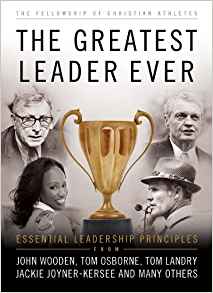
I’m telling you, Osborne was unique, just the way that he did it. And one of the terms I’ve always used is that I believe an effective coach will make you “want to run through a wall for him.” And Osborne had that ability. I don’t know if it was a luxury of his legacy, I don’t have an answer to that. But I’d have done anything. If he’d have asked me to do something I would have done it, and without question. And again, he didn’t have to break any chairs to get me to do it. I always thought it was amazing that a guy of his demeanor was so successful at football.
Q: “There’s more than one way to skin a cat”?
MG: Yeah. And look at some of the most successful coaches today. You had Lou Holtz, and that guy was fiery. That dude gave some nice motivational speeches. Urban Meyer had a lot of success, but we’ve seen him in action. That dude’s a little looney: He wanted to fight a reporter the other day. Compare that to Osborne, man, holy cow! I don’t know how he did it, but he did it. (laughs)
Q: As far as the staff dynamic, I’m of the opinion that he hired some staff to play the fire to his ice… and I say that with Charlie McBride at the forefront in my mind.
MG: I wouldn’t disagree. I understand where you’re going. He stands out to me… a lot. I want to say ‘yes’, but still maintaining the demeanor of –I want to say the word ‘educated’- they still did it with a dedicated, educated manner. I have a great perspective, I feel, because after I got done at Nebraska I went to Washington State as a strength coach. Before I got into insurance I got to see Mike Price.
Now, he was a fire & brimstone motivator and his coaches were the same way. And we’re talking cuss words and swearing. Not like sailors, right? But in a typical locker room fashion. So what I’m trying to say is, Osborne did hire… and he got guys to do the fire & brimstone: you had Coach McBride and Coach Bohl while he was there, (now Coach Samuel was very calm) but they did it in a way that was still professional and in a manner that still reflected the philosophies of Osborne.
Q: ‘Educated, enlightened brutality,’ maybe?
MG: Maybe. Washington State? Mike Price was great. They were good, with Ryan Leaf‘s junior year when they played Michigan in the Rose Bowl. They were in the top 5 and I was lucky enough to be there. Mike Price gets up before the season and says, “You know what? We have great talent, and I’m gonna make a commitment that I’m not going to drink this season.” He’s like, “I’m not going to drink alcohol. I’m not going to party. Because I’m going to focus on football.” I mean, who says that? Now trust me, I could have played for Mike Price, too. I loved Mike Price. But it was 180 degrees different than what I was used to at Nebraska.
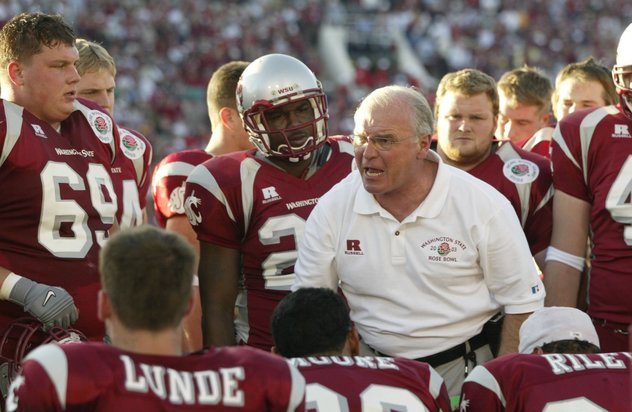
Mike Price
Q: Interesting. And yet they both found success.
MG: They did find success. I do think Mike Price had to do that in Pullman, Washington. He had to try to find a way to motivate and recruit and things like that. But it was an interesting perspective: the Nebraska staff, even though there was fire & brimstone, they still handled themselves in a very professional, mature manner. That’s my perspective. You may be getting some different answers from different guys, but that’s my perspective.
Q: Did you have any other special bonds with some of the other coaches?
MG: I wouldn’t go so far to say that I developed bonds, because when I was there I was primarily with Coach Brown and that was it.
Frank Solich, I don’t want to say I developed a bond with him, but I really liked Coach Solich. As a matter of fact, when old Pederson came back and fired him, I sure wouldn’t have minded driving down there and hitting old Pederson right in the trachea. I understand that’s not Coach Osborne’s philosophy for getting by in life -I get that- but I really admired Coach Solich. I admired the way he approached things, I liked the way he coached, I liked the way he motivated. I liked him all around, he was great.
Milt Tenopir was awesome. The guy constantly burped. (laughs) Coach Dan Young was the greatest. He recruited me, so I’ll always have a special place in my heart for Dan Young. The defensive coaches, I didn’t really get to know that well. Solich always stood out to me. And matter of fact, the thing that hurt the worst about the Frank Solich firing was, “Gosh darnit, give the guy a chance. Give him ten years.” All Coach Solich needed to land was a quarterback on the level of Crouch, Frost and Frazier and he would have had another trophy sitting in that room.
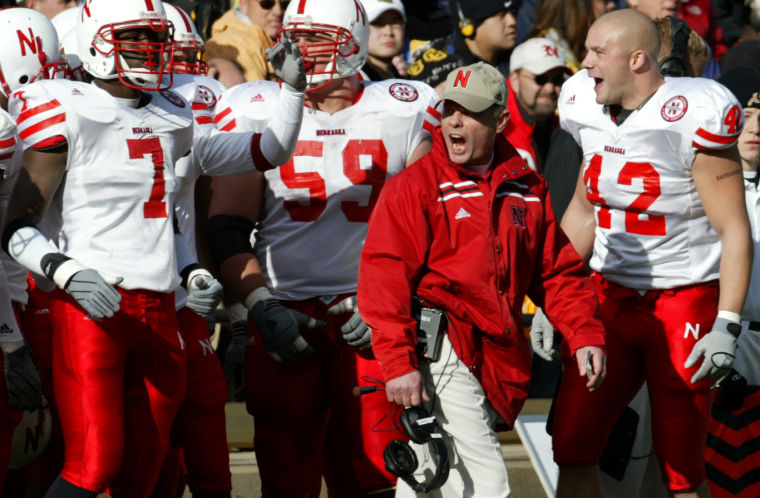
Q: That quarterback may very well have been recruit Carl Crawford, the guy who decided to go with pro baseball instead…
MG: Yeah, and Solich almost landed Vince Young. I swear to God, I think he almost landed Michael Vick or Marcus Vick, too. He was a quarterback away from winning a national championship. Think about Coach Osborne: he could have gone for one and won it all with Turner Gill.
And Tommie Frazier? He won championships. And I know Brook played most of our junior year, but Frazier was very instrumental in winning that first national championship game. And I’m getting off on a tangent here, but Solich was a quarterback away from winning the championship.
Q: Do you remember the first game you played in, Mark?
MG: Oh yeah. Significantly. The first game I played in, William Washington and Gerald Armstrong were hurt, and I caught the ball in what was known as a Two Delay Flat against Missouri. And it was the greatest day of my life. (laughs) I was a sophomore and they put me in on the goal line and I, basically, I still remember it to this day. I blocked for a count and then I got out for pass. And I caught it. And I almost scored a touchdown, and that was awesome. But I only played in about four plays in my sophomore year. That was awesome.
But my initial, most significant playing time was in the Kickoff Classic against West Virginia. And you asked me if I remember it? I remember it like it was yesterday. Because it was probably the greatest feeling in the world knowing that the previous three years of absolute blood, sweat and tears paid off in that game. And being part of Nebraska Football and going out there and knowing that we had a hell of a team playing in the Kickoff Classic -I actually contributed to some key blocks- and we had five turnovers with fumbles and interceptions, and we still beat them, if I’m not mistaken, by 33-0. And we had five turnovers! We gave them Christmas presents and we still pummeled them. And that’s when we were like, “Holy crap. We’re really good!” (laughs)
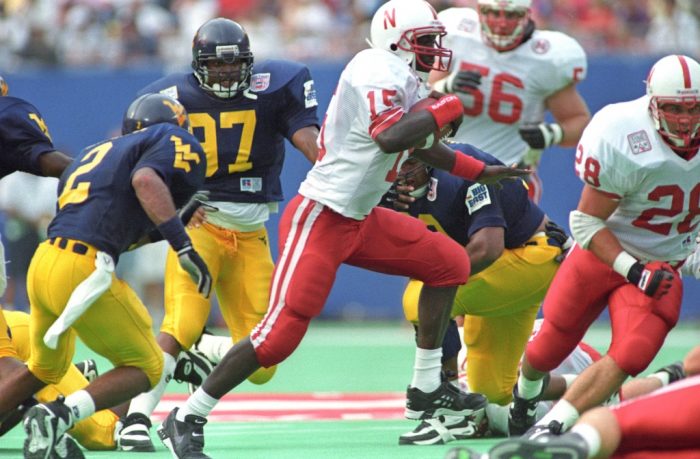
Q: That was the first game after that summer of 1:16 and ‘Unfinished Business,’ right?
MG: Yes, you’re 100% correct. Yes, you better believe it. It was the summer after the 1:16 in that Orange Bowl versus Florida State. Everybody stayed in town the whole summer, or at least three-fourths of it.
Q: Let me ask you about that summer. Some say the team was already poised for greatness before that game and some say that the Florida State game was a turning point for the program. What would you say?
MG: This is my opinion: the Florida State game was a turning point. And here’s a couple reasons: I truly believed when we switched to that undersized speed defense, that was huge. I wasn’t a defensive player, but I don’t think enough people put an emphasis on the fact that the preparation for the Florida State game… we played a lot of dime defense. Watch the film of the game, but we moved a couple dudes up from safety and moved them to linebacker. We turned to that heavily the next year, and I think the success we had my junior and senior year was because that defense was fast as hell. You go through the roster again, and look at the starting defense my junior and my senior year. I believe that every person on that starting defense ran a 4.4 in the linebacker and secondary positions other than Phil Ellis at linebacker, who ran a 4.6.
I believe that Florida State was a turning point not only in the defensive philosophy, but also, if you take Nebraska history before I got there, we could not ‘win the big one’, right? Well, in football you start to get athletes who go into games thinking, “Hey, I hope we do well. I hope we don’t get embarrassed.” I believe that happens in football, and I believe that might have been kind of the philosophy and the feelings of a lot of my teammates in the years previous.
So what I’m thinking is, when you go into games like that 22-0 loss to Miami that year before we played Florida State -and maybe some people won’t want to hear me say this, so you might want to turn your tape off- but I think in those years previous we had some guys going into that game thinking, “Man, I just hope we don’t get killed -like 45-0- I hope we don’t get embarrassed.” Now, in the Florida State game I kind of felt a shift in one year. We were real confident when we were playing Kansas, but when we had to go to Miami and play Miami it was, “Oh boy, I hope we make a good showing.”
But I felt a shift in the Florida State game. I felt it just before that game when the defense went to that speed and it was against Charlie Ward and his Heisman and all their athletes. And I felt we started to kind of shift to, “You know what? I like this defense.“ We had confidence. We went out there and we should have won that game.
Q: We did.
MG: We did, right? You’re right in saying that, too. And there’s a lot to be said about that game. If we would have won that game we might have been less motivated the next two years. But anyhow, that’s a different conversation. (laughs) But I felt that Florida State game when we went out there –and realistically, the scoreboard didn’t say we won- but that was the turning point that said, “Hey, I think we’re something special.”
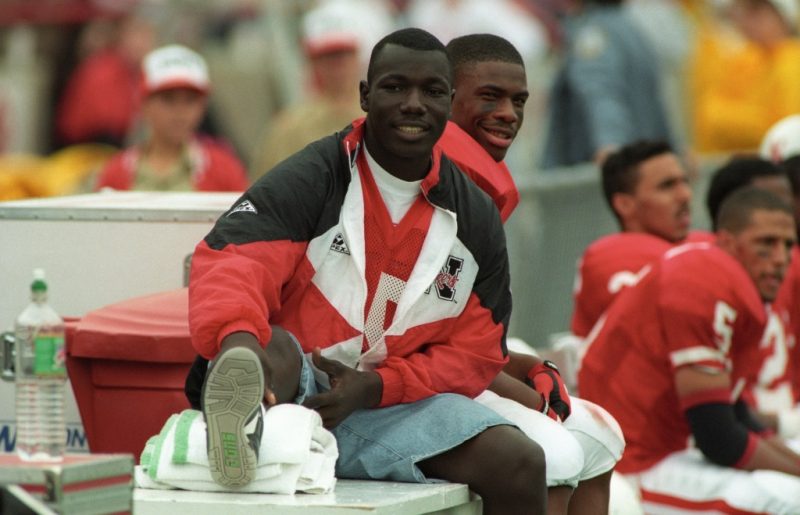
Especially with Frazier, the quarterback who had no fear. He didn’t give a crap if it was Florida State or if it was Kansas. And that defense, with that speed philosophy, with those linebackers who were running 4.4 forties and brought the heat, I could sense that they did not care that it was Florida State and not Kansas. That was absolutely huge!
Q: A monstrous mental hurdle to finally overcome?
MG: It’s a mental hurdle. And in football, more than any other. In my opinion, if you think about football, it’s a violent sport. A violent sport and it’s a fast sport, it’s a quick hitter. And if you are just out there saying, “Oh boy, I hope we make a good showing,” you’re done.
Q: Jerry Weber said something to that effect, “This is Nebraska and we will win.”
MG: And it shifted to that. I saw a shift. Nebraska felt that way. I felt that way from day one when we played Kansas, played Missouri, but then it was, “Oh shit, we’re playing Oklahoma,” or “Oh shit, we’re playing Florida State or Miami. Boy, those guys are sure fast. Boy, oh boy, how are we going to stop those four wideouts? How are we gonna to stop that no-back set.”
And then after that game it went to, “What’s the line? Oh, we’re favored by four? We’re gonna win by thirty!” (laughs) Do you know what I’m saying?
Q: (laughing) I hear you. I hear you…
MG: And the coolest thing was, too, and this is another point: when Trev Alberts had how many sacks on Charlie Ward, I thought it was freaky, like he had five or six. So you’re going from previous bowl games of not even touching the quarterback -and watch the film, we didn’t have enough speed. We were built for power. We couldn’t put pressure on opposing quarterbacks- and then all of a sudden, we played Florida State and we switched to that speed and Alberts comes off the corner and he hit Charlie Ward. Let’s say he had four sacks, but I guarantee you he hit him after he threw five or six times…

Q: With only one arm, by the way.
MG: Yeah, with one arm because of that elbow. And all of a sudden you see stuff like that and your demeanor changes and then it switched. I felt it switched after that game. And beside the fact that we should have won that game, the fact that the psychological ploy of putting a minute-sixteen up on the scoreboard when we worked out? Now, that put us over the top.
Q: You’re now a great white shark and there’s blood in the water?
MG: The blood’s in the water. “We’re on. We’ve got a new defense. We’re going to bring it and pin our ears back. We’re sideline to sideline on defense. We’ve got Tommie Frazier running the show. We’ve got four I-backs who could have started anywhere in the nation. We’ve got an offensive line that can move and they’re 300 pounds across.” I mean, it was on! (laughs) And then having proved it by beating Florida State? Like you said, we beat them. The scoreboard didn’t reflect it, but that was the turning point.
Q: You brought up Tommie Frazier as being unique and fearless. In case I can’t convince him to assist with this project, could you, for lack of a better word, ‘disassemble’ him for me. What made Tommie unique?
MG: Confidence. Period. That’s what made him unique. There were other kids with his athletic ability. He was a freaky athlete, by the way. I once saw him dunk a basketball one step inside the free throw line at only 6’ 2”, just so you know.
Now, there’s a lot of freaky athletes, but he comes in as freshman, 18 years old, and he had confidence. I compare my first day as an eighteen year old, wanting to pee down my leg after seeing Travis Hill knock me on my butt five times in a row. But Tommie Frazier comes in and takes control of the huddle, alright? Tommie Frazier, he made some mistakes, but they didn’t bother him. He was like, “I messed up. Next play.“ Confidence. I would sum him up like that.
And now that I have some retrospective on Tommie Frazier, I want you to think of Michael Jordan or Kobe Bryant. (I love the NBA, so I’ve really studied and followed Jordan and Bryant) When was the last time that Kobe Bryant or Jordan were afraid to get in their teammate’s grill and demand performance? Do you remember Jordan? Jordan, that dude would publicly call his teammates out.
And Frazier, when he got control of the reins he wasn’t afraid to tell a senior when he was a freshman, “Hey senior, you dogged it on that play. You dog it on that play again and we’re not going to win. If you dog it like that in a game we’re not winning.”

Available on Amazon.com
Q: I’m sure that may have hurt a few feelings at first?
MG: It made Tommie not as well-liked, as you would expect. But in retrospect, it was wonderful. Because look at it: Tommie was never voted captain. He wasn’t voted captain, right? Because he was rough. I remember a couple times him treating me like crap. Do you know what I’m saying? But when you looked at it and thought about it you were, ‘He’s right.’
And then he always worked hard in practice. He was a leader, and he led by example and he led by demanding excellence of people and he always demanded it of himself. He was a leader, and that was the word: confidence.
Q: Obviously, it wasn’t false, a façade of confidence. He wasn’t just putting up a front?
MG: No. From day one. That’s why I was surprised -I’d heard a rumor that he’d actually gotten homesick and he’d considered transferring down to Florida or Florida State or something, and they’d talked him out of it, which surprised me- just because I never saw any chinks in his armor or any weakness. Not that I think it’s a weakness, because I think it’s human nature to miss your home, but I just thought that was kind of surprising.
Q: Do you happen to have a favorite game?
MG: Oh, gosh. Of course the first ones you start thinking about… I start thinking about the most nostalgic things for me like first touchdowns and things like that. But I think I’d pick an occasion that’s a nostalgic one for me and a huge one for the University of Nebraska, and it has to be the first national championship versus Miami.
Q: Why would that be?
MG: I guess, on a personal note, I caught the first touchdown in that game from Brook Berringer. Obviously, that was huge. (laughs) And I think what it comes down to, and you had mentioned it before, because I think you have a feel -and most people might not have a feel for what it takes to make it in a major college football program. Not just to make it through, but to then have significant playing time and things like that- but the thing for me was that I was a sort of a blue-collar worker, because I had to work for everything that I got.
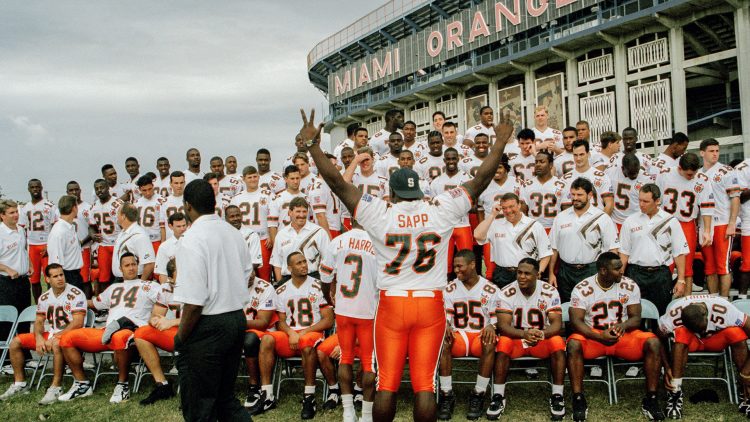
I mean, I had some natural ability, but to get on the field and make it there at Nebraska I really had to do a lot of conditioning, strength training, strengthening my body, lifting weights hard and studying film, to give myself the chance to play. So the reason that was my most memorable game was because going out on a route -we had zero points and Miami had ten- Ray Lewis was the middle linebacker and I beat Ray Lewis on the play and caught a touchdown.
Think about it. How many people saw that? And what it meant for our team as far as a psychological effect in getting that zero off the scoreboard and scoring a touchdown? And then ultimately winning that game and knowing that I had something to do with it, and then making every single minute, every single second of work that I put in, worth it in one play? I scored three career touchdowns, but the one in the Orange Bowl counts for twenty. (laughs)
You know, it’s really funny, too, because I still to this day… a day does not go by that I do not think of that play.
Q: Really?
MG: Oh yeah, God.
Q: What is it? What makes you think of that play?
MG: It’s just… I don’t know. You know, I didn’t play in the NFL, and that was it for me. That was the deal.
And you have to look at it this way, too: a couple things could have happened on that play. I could have dropped that ball. I drop that ball, and who knows, man? I mean, psychologically that would really have hurt me. I have the demeanor where if I would have dropped that ball I would have thought of it every day in a negative way and it would have been a downer.
Q: It would have just eaten away at you, huh?
MG: It would have eaten away at me. It would have been a tough deal. But since I caught that bad boy it’s had the opposite impact. I can be having a rough day and there’ll be times where I go, ‘At least I caught that pass’-I’m not kidding. It might seem weird, man…
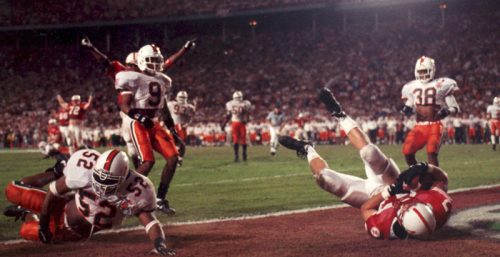
Q: “At least I did one thing right in my life,” huh? (laughs)
MG: Yeah. “At least I caught that pass.” So that was my most memorable game. And just the way that we won it, with those gut-wrenching drives at the end with Cory Schlesinger pounding it into the end zone and the celebration that we had in the locker room. Are you kidding me? That will never ever go away.
To be continued….
Copyright @ 2013 Thermopylae Press. All Rights Reserved.
Photo Credits : Unknown Original Sources/Updates Welcomed
Author assumes no responsibility for interviewee errors or misstatements of fact.